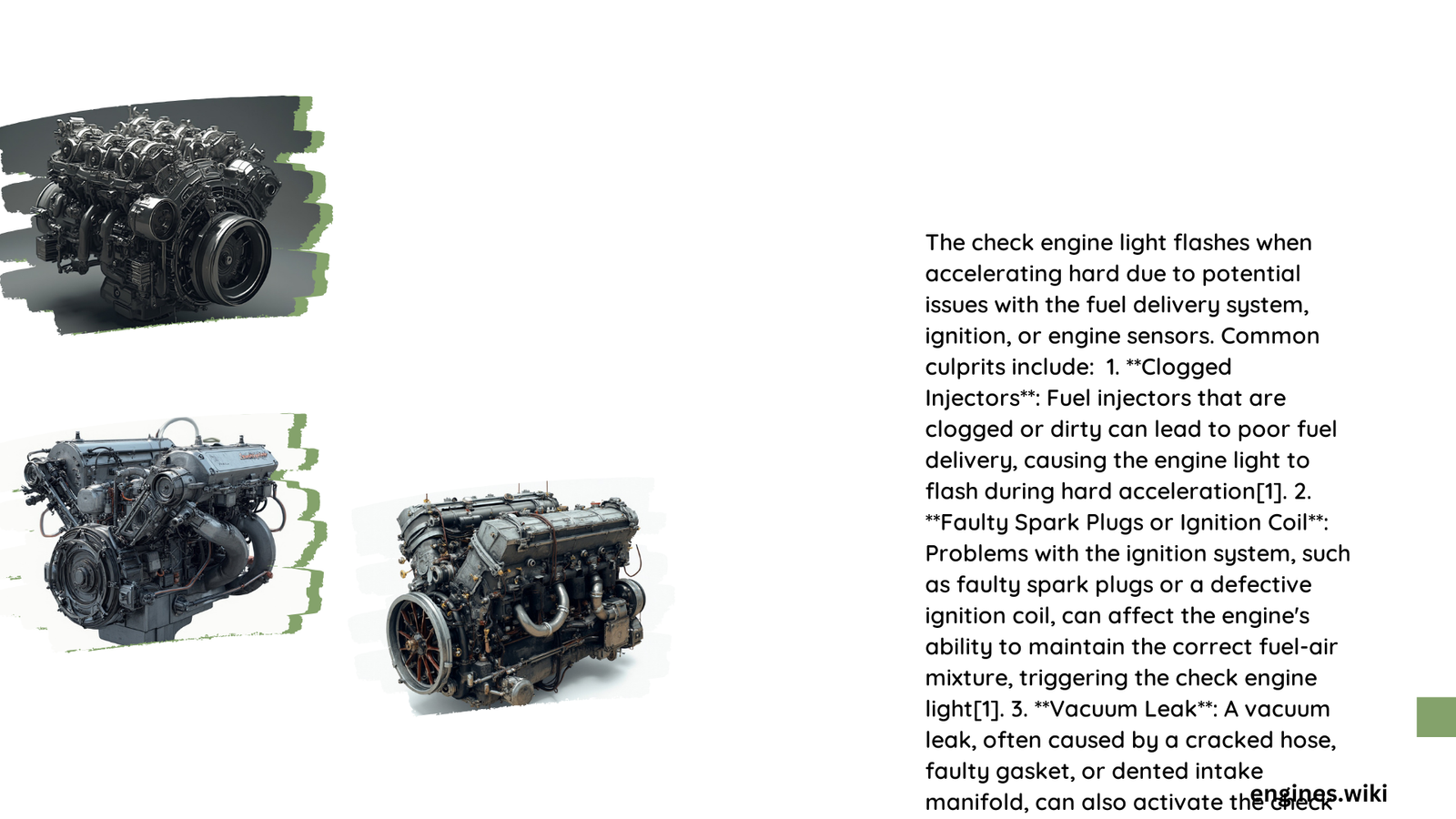A flashing check engine light during hard acceleration is a serious warning sign that requires immediate attention. This issue typically indicates severe engine misfires or critical problems that could potentially damage your vehicle’s catalytic converter. Understanding the causes, diagnostic procedures, and potential solutions is crucial for maintaining your vehicle’s health and performance.
What Are the Common Causes of a Flashing Check Engine Light During Hard Acceleration?
The flashing check engine light during hard acceleration can be attributed to several factors:
- Severe Engine Misfires: This is the most common cause, often related to ignition system failures or fuel delivery issues.
- Faulty Spark Plugs or Ignition Coils: Worn-out spark plugs or malfunctioning ignition coils can lead to incomplete combustion.
- Fuel System Problems: Issues with fuel injectors, fuel pressure, or fuel quality can cause misfires.
- Sensor Malfunctions: Faulty oxygen sensors or mass airflow sensors can disrupt the air-fuel mixture.
- Exhaust System Issues: A damaged catalytic converter or exhaust leaks can trigger the warning light.
How Can You Diagnose the Problem?

Diagnosing the issue involves several steps:
- Use an OBD-II Scanner: Connect a diagnostic tool to read any stored trouble codes.
- Check for Misfire Codes: Look for P0300-P0308 codes, which indicate cylinder-specific or random misfires.
- Inspect Ignition Components: Examine spark plugs, ignition coils, and wiring for signs of wear or damage.
- Test Fuel System: Check fuel pressure and injector performance.
- Examine Sensor Data: Use advanced diagnostic tools to analyze sensor readings during acceleration.
What Are the Potential Consequences of Ignoring a Flashing Check Engine Light?
Ignoring this warning can lead to severe consequences:
- Catalytic Converter Damage: Prolonged misfires can overheat and destroy this expensive component.
- Engine Performance Degradation: Continued operation can lead to reduced power and fuel efficiency.
- Increased Emissions: Misfires result in higher pollutant levels, potentially failing emissions tests.
- Complete Engine Failure: In extreme cases, ignoring the issue can lead to catastrophic engine damage.
How Much Does It Cost to Fix This Issue?
The repair costs can vary widely depending on the root cause:
| Component | Price Range | Labor Hours |
|---|---|---|
| Spark Plugs | $20 – $200 | 1 – 2 hours |
| Ignition Coils | $200 – $600 | 1 – 3 hours |
| Fuel Injectors | $200 – $800 | 2 – 4 hours |
| Oxygen Sensors | $100 – $300 | 1 – 2 hours |
| Catalytic Converter | $500 – $2500 | 2 – 4 hours |
Note: Prices may vary based on vehicle make, model, and location.
Can You Drive with a Flashing Check Engine Light?
It is strongly advised not to drive with a flashing check engine light. Here’s why:
- Risk of Severe Damage: Continuing to drive can cause irreparable harm to your engine and catalytic converter.
- Safety Concerns: Engine misfires can lead to unpredictable performance, potentially causing accidents.
- Legal Issues: In some jurisdictions, driving with a flashing check engine light may be considered negligent.
If you must drive, do so cautiously and for the shortest distance possible to reach a safe location or repair shop.
What Are the Steps to Prevent This Issue in the Future?
To minimize the risk of encountering this problem:
- Regular Maintenance: Follow your vehicle’s recommended service schedule.
- Use Quality Fuel: Choose reputable gas stations and consider using fuel additives occasionally.
- Replace Wear Items: Change spark plugs, air filters, and fuel filters at recommended intervals.
- Address Minor Issues Promptly: Don’t ignore small problems that could escalate into major ones.
- Monitor Engine Performance: Pay attention to any changes in how your vehicle runs or sounds.
Conclusion
A flashing check engine light during hard acceleration is a critical warning that demands immediate attention. By understanding the causes, diagnostic procedures, and potential solutions, you can protect your vehicle from severe damage and ensure its longevity. Remember, prompt action and regular maintenance are key to preventing these issues and maintaining your vehicle’s performance and reliability.
References:
1. Silverado Sierra Forum: Flashing check engine light at hard acceleration
2. Tacoma World: Check engine light flashing when accelerating, then stops?
3. Expedition Forum: Engine light flashing when I accelerate
4. CarTreatments: Why Is My Check Engine Light Flashing When I Accelerate?
5. AxleAddict: Why Is My Check Engine Light Flashing and Car Shaking?
